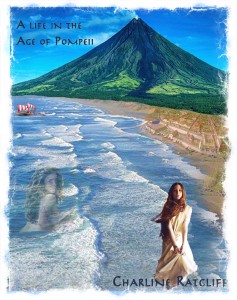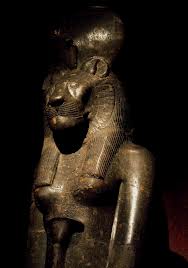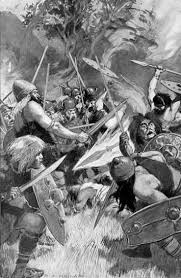Interview with Charline Ratcliff, Author — Part 3
I’m happy we have finally arrived at the information about Charline’s writing, which I find fascinating because she writes about vivid dreams she has had. The dreams are so detailed, they could even be glimpses of past lives, if you believe in reincarnation…
Interview first published:
We touched on the subject of dreams and past lives in the previous post, and now to continue:
Charline, you write historical romance, and when I was reading your book, The Curse of Nefertiti, I remember thinking you must have spent hours doing research, and yet you say you hardly had to do any. Is that really true? Tell us a little about the book, and how your Prologue is a direct translation of the dream.
The entire prologue can be viewed here:
http://www.thecurseofnefertiti.com/Prologue.html
 Actually Trish, I would say that I write historical fiction as not all of my books will feature romance. The Curse of Nefertiti just happened to have a romantic aspect, especially since I needed to show an amazing bond with enough strength and passion to have endured for several millennia. Unfortunately, due to life happening, coupled with a low back injury, A Life in the Age of Pompeii (a story that’s more biographical in nature) isn’t quite finished for publication. But, it’s close!
Actually Trish, I would say that I write historical fiction as not all of my books will feature romance. The Curse of Nefertiti just happened to have a romantic aspect, especially since I needed to show an amazing bond with enough strength and passion to have endured for several millennia. Unfortunately, due to life happening, coupled with a low back injury, A Life in the Age of Pompeii (a story that’s more biographical in nature) isn’t quite finished for publication. But, it’s close!
As far as research for The Curse of Nefertiti… Truthfully, I spent the majority of my time researching what I had written; after I wrote it. At times, the accuracy, or the reason for the why of a passage, (or a character), was exceptionally eerie.
Let me provide you with an example. Were I to choose an ancient Egyptian deity who I could identify with, I would choose Isis. (She does, of course, appear in this tale). I’ve also mentioned in previous interviews and/or discussions, that: “while writing The Curse of Nefertiti, I allowed the book to write itself.”
To the reader, as they make their literary journey, the various characters and deities will make sense; but to me, while I was writing it, they didn’t always. I never expected Sekhmet to make an appearance, and certainly not on page twenty-one. After she arrived in the story, I never expected her to play such a huge part; yet she did.
 So, finally, two-thirds of the way through my writing, I went and researched Sekhmet to better understand why she was such an integral part of this tale. What I discovered was quite surprising…
So, finally, two-thirds of the way through my writing, I went and researched Sekhmet to better understand why she was such an integral part of this tale. What I discovered was quite surprising…
According to Ancient Egyptian history, the father of Akhenaton (King Amenhotep III) ‘especially revered Sekhmet.’ In fact, some of the historical inscriptions described him as: ‘beloved of Sekhmet who smites the Nubians.’ Additionally, I discovered that more than 730 life-sized statues of Sekhmet had been erected in King Amenhotep III’s mortuary temple.
After learning this, I understood why Sekhmet would have displayed such ferocious care and concern for Akhenaten (and subsequently Nefertiti). Akhenaten was the son of one who was most favored by her. I also understood why Sekhmet would have been an important deity to Akhenaton; even with the monotheism of the Amarna period. Just because you state that there is one main God, doesn’t mean you lose all fondness and love for the other deity’s you were raised with; especially when those deities are devoted to you.
And to answer the last part of your question: how is my Prologue a direct translation of my dream… Well, the Prologue itself is the actual dream and not just a translation. The parts that weren’t kept in the Prologue were used throughout the remainder of the story, including that last “ending” line. And yet, the end of my dream didn’t quite wind up being the book’s end… It was the end of my dream, but it didn’t feel right for the book’s end. Several days later, midway through a shower (since water is my muse) the final closing story came to me and then I knew the book was completed.
You’ve written down five other dreams. What historical times and locations are we talking about here? How do you know the approximate dates?
Well, let’s see…
The second dream I had written down, actually occurred the night after my Ancient Egyptian dream. This dream though was set in an older Ireland; an Ireland of around 1200BC. This was a rugged and treacherous land; one that did not allow the ignorant or foolhardy to live long. At this point in time, Ireland was home to the Celts, and they embraced their own deities: Dagda, Brigit, the Morrigan and countless others…
 While this book will certainly feature the historical aspects of that age, the main storyline will focus on the in-fighting between the Gods. And also on some of the creatures they created; such as werewolves. However, you should know that the werewolves of Celtic lore were not evil fiends, but that doesn’t mean that I can’t embellish the mythology…
While this book will certainly feature the historical aspects of that age, the main storyline will focus on the in-fighting between the Gods. And also on some of the creatures they created; such as werewolves. However, you should know that the werewolves of Celtic lore were not evil fiends, but that doesn’t mean that I can’t embellish the mythology…
Another dream is set in Atlantis, the city of myth. Yet, one must wonder if it really is… After all, Pompeii was real, but then it was lost to fables only to be found again.
The Atlantis of my dream was an amazing city. Full of knowledge, and with no limits. Anything was possible because each of us intrinsically understood the workings of the universe around us. We had the mental ability to affect change; to bend the world to our will. Yet, even as our now-vast-knowledge allowed us a transcendence of sorts, our understanding of: right vs wrong, good vs bad, positive vs negative, or light vs dark, had not evolved much beyond something akin to today’s 21st century.
In the Atlantis of my dream, humanity had access to everything they could think to desire; but still there were those who could not, or would not, release those darker, base human desires. The Atlantean High Council felt they could overcome this aspect of the human psyche; but … pride doth always goeth before the fall.
In the end, Atlantis was lost. Not due to some catastrophe of nature (we had already conquered and manipulated the world to suit our needs) but because we chose to remove that level of knowledge from the world. We did not wish to be responsible for the possible demise of future civilizations; therefore we destroyed Atlantis in her entirety.
Mankind will once again attain that level of intelligence, but we realized that they would need to find it on their own. We hoped that with the many millennia necessary to reach those broadened heights of intelligence; mankind’s darker parts would evolve for the better…
There is also a dream that begins in Romania, (in the mid to late 1800s), then moves to America before returning to Romania in the early 1900s.
A quick synopsis:
Queen Elisabeth (of Romania) had a daughter. A curious and independent child from birth, she left Romania to go visit the Americas. (To see what all the fuss was about).
The Queen’s daughter (Maria), had a beautiful voice; and at night she sang in a saloon. One night, one of the patrons (James), stayed after closing to ask if she would accompany him to dinner the following evening. She agreed, they courted and over time they fell in love.
Several years later, during the spring of 1912, Maria received an urgent communication that her mother was ill. At this point she was forced to explain to James who she really was and that she had to leave. Her time in the Americas was finished. Needless to say, he was devastated beyond belief.
Maria hurriedly packed and departed, and James was there to see her off. Yet, when the boat finally docked in the Port of Canstanta, Maria was nowhere to be found.
This novel will be written from the perspective of James, and the reader will not know who Maria is until that fateful day in 1912. And even though James watched her leave, he doesn’t believe she really left. This also seems to be validated by her lack of arrival in Romania. So for these reasons plus love, he wanders the streets every night, hoping to again hear her voice. And who knows if he ever will…
I will leave off with three of the five, so that I can answer the final part of your question: how do I know the approximate dates?
My dream of Ancient Egypt was easy to identify as the dream included the famed bust of Nefertiti. (Although in the dream it was a different color). Pompeii was also easy because of the culture, garb and gee, the volcanic eruption… *chuckle*
However, when I have less historically altering information then I must become a history sleuth. This means that once I’ve written the specific dream out, I will take any and all pertinent information I’ve been provided and backtrack through time until something starts to fit.
Then I will take the additional information and verify that also fits. Everything must fit together, (kind of like the pieces of a puzzle); otherwise I know I’m not in the right time period. And then, the final piece of the puzzle is me. I can think I’ve found the right location, the right time period, or the right history, but if it feels “wrong” to me with regard to that “physical recognition” I have previously mentioned, then I know I need to keep looking.
That’s also why I started writing A Life in the Age of Pompeii prior to my Ireland book, even though the Ireland dream came first. I still can’t locate the correct recognition within myself. I can see the lands. I can see the high, jagged cliffs and the stark white rocks. I can see and feel parts of the Celtic history and mythology and yet I cannot pinpoint the location within Ireland. Due to the fact that so much of early Celtic history has been lost, or hasn’t made it outside of the country, I have this sense that I won’t find/recognize it until I actually stumble upon it in person. I guess I’m going to need to spend some time in Ireland. Oh, darn…
I’d love to hear about your next book, which is also the result of one of those dreams and is about Pompeii before the eruption of Mount Vesuvius. Please tell us more, and give us your first paragraph.
 Well, A Life in the Age of Pompeii, provides a “biographical” story of a girl who was brought to Pompeii as a slave, yet was raised as the daughter of an influential town councilman. This is a fictional tale, but it is historically accurate to the occurrences of the age; whether cultural, political, agricultural and/or religious/mythological. And even setting aside my back injury, this tale has been immensely difficult to write.
Well, A Life in the Age of Pompeii, provides a “biographical” story of a girl who was brought to Pompeii as a slave, yet was raised as the daughter of an influential town councilman. This is a fictional tale, but it is historically accurate to the occurrences of the age; whether cultural, political, agricultural and/or religious/mythological. And even setting aside my back injury, this tale has been immensely difficult to write.
My dream for this book came about as a dream within a dream, within yet another dream, (mine). Consequently, I had to work exceptionally hard to convey that “dream within a dream” aspect in the Prologue.
The first half of A Life in the Age of Pompeii was a joy to write. The various experiences of this young child easily filled the beginning chapters. But then this child began to grow up, and my writing began to slow down; for there is only one end to work toward. This is no happily-ever-after story… There is no future for this woman. No husband to love and bear children with. No grandchildren to fawn over in her old age.
This is the story of a life lost; a life of but one among the thousands. An ending suspended in time; without even the dignity of burial. A life, and a city, that were forgotten over the centuries; finally rediscovered and put on display for the world to gawk at in horrified fascination. Pompeii did not die in a fiery volcanic eruption; instead she, and her citizens, languished away under a smothering blanket of ash; twenty feet deep in some places.
The book’s jacket blurb is written as if from the archaeologists who unearthed this woman’s subterranean tomb; while the story is written first-person, from her.
Here’s the link to read: Jacket Blurb
Here’s the link to read: The Prologue
To partially quote the back cover’s last line:
“…this is her story. Will you listen?”
Thank you so much for agreeing to the interview, Charline. I look forward to your next book with great anticipation.
Trish, this interview was truly my pleasure, and I sincerely appreciated the honest interest of your questions. Thank you very much for your time in formulating them, as well as for featuring me on your blog.
And! I’m almost done with the writing of A Life in the Age of Pompeii, and I look forward to having you read it. (I’ll even include a box of Kleenex as you might need them. I know I have).